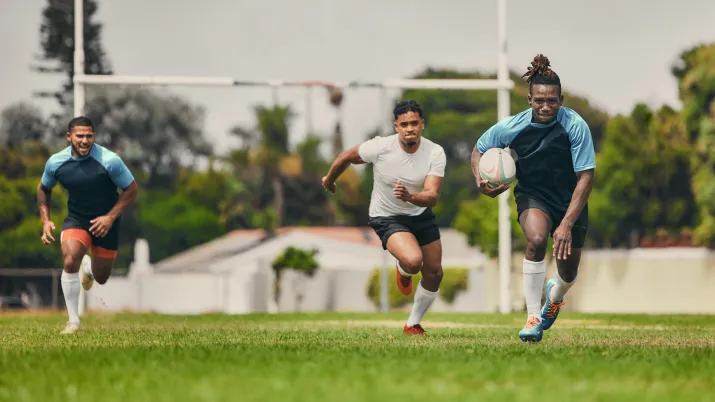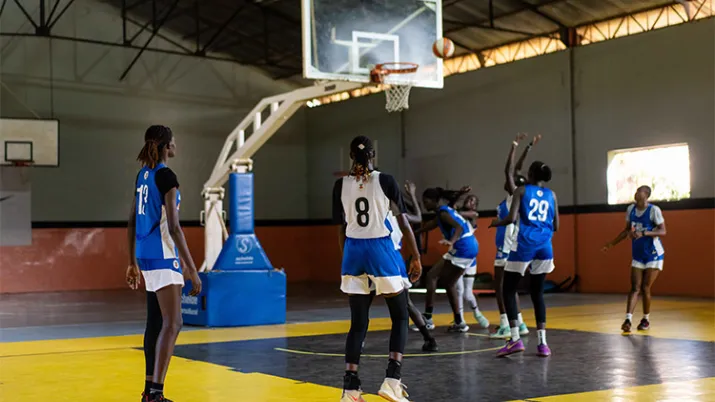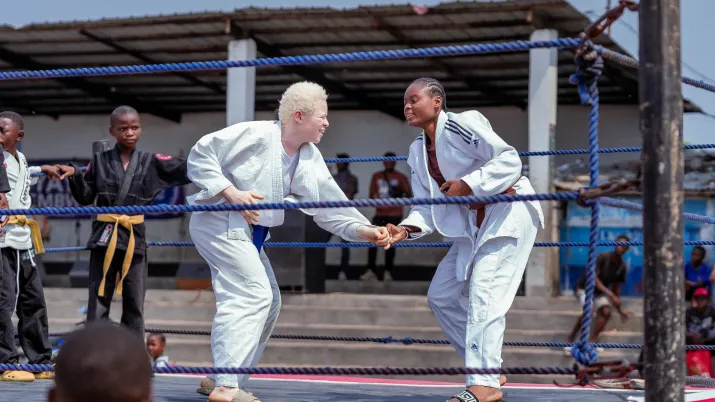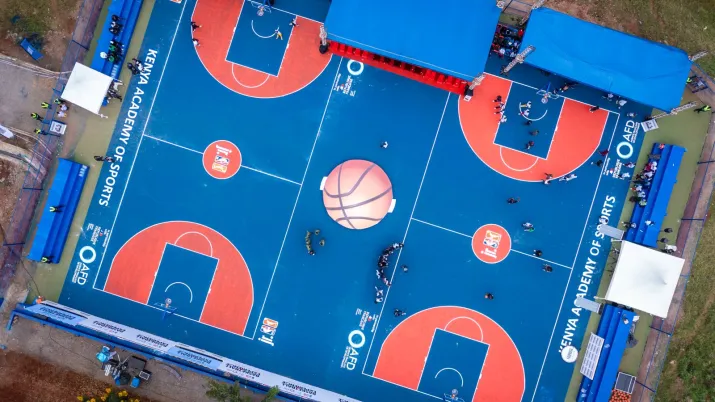Partager la page
Basketball Experience Programme - Un terrain, notre futur
Projet
Publié le
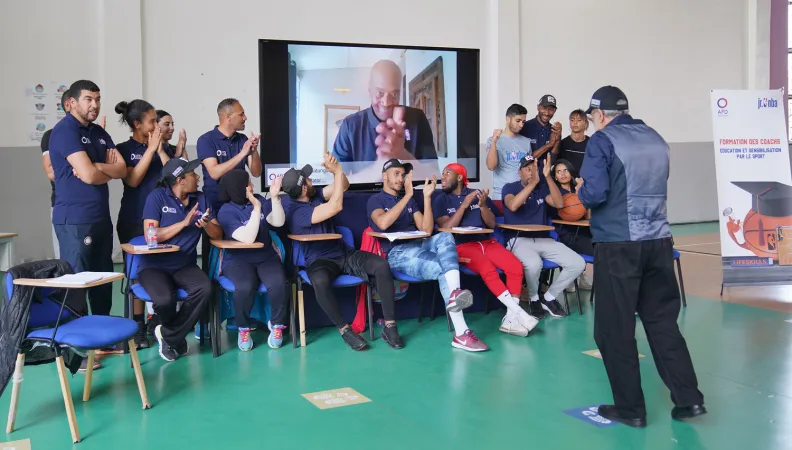
-
Date de début du projet
-
État
En cours
-
Date de fin du projet
-
-
Montant (euro)
-
5 M
-
Pays et région
-
Afrique du Sud, Kenya, Maroc, Nigeria, Sénégal, Afrique
-
Bailleurs
Ce programme s’inscrit dans le cadre du partenariat « Sport et Développement » signé entre l’AFD et la NBA. Il vise à développer l’utilisation du sport comme vecteur d’éducation et de sensibilisation des jeunes à travers des programmes socio-éducatifs mêlant la pratique du basket à l’apprentissage des compétences de vie liées aux thématiques du développement durable.
Le sport, nouveau levier d’éducation et d’inclusion sociale
L’idée que la pratique du sport joue un rôle significatif dans la promotion de l’intégration sociale et du développement économique dans les différents contextes géographiques, culturels et politiques est aujourd’hui de plus en plus partagée à travers le monde.
L’UNESCO considère le sport comme un outil puissant de renforcement des liens sociaux et de promotion des idéaux de paix, de fraternité, de solidarité, de non-violence, de tolérance et de justice. C’est également un moyen permettant de contribuer à une meilleure insertion sociale et professionnelle des groupes les plus vulnérables. De même, une initiation sportive permet de sensibiliser les jeunes, et en particulier les filles, à de nombreux problèmes sociaux ou sanitaires.
Déjà reconnu par la 65e Assemblée générale des Nations unies pour atteindre les objectifs du Millénaire pour le développement (OMD) de 2015, le rôle capital du sport en tant qu’outil de développement et d’inclusion sociale fait désormais partie intégrante de la stratégie d’aide au développement des Nations unies à l’horizon 2030.
Le programme Basketball Experience, le basket-ball au service de l’éducation
Le programme Basketball Experience d’éducation par le sport en Afrique s’inscrit dans le cadre du partenariat « Sport et Développement » signé en juin 2018 entre l’AFD et la NBA, principale ligue de basket-ball mondiale.
Il entend créer une dynamique en faveur de la pratique sportive au sein des établissements scolaires et des villes des cinq pays d’intervention : Maroc, Nigéria, Sénégal, Kenya et Afrique du Sud. À cet effet, il est essentiel d’obtenir le soutien des acteurs institutionnels. Il vise également à susciter l’intérêt des pouvoirs publics, des communautés et des familles et à les sensibiliser aux bienfaits de la pratique sportive régulière sur la santé et le développement personnel des jeunes, notamment des jeunes filles.
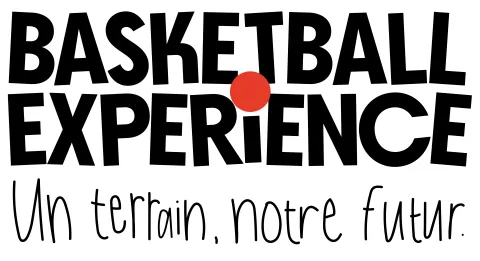
Dans chaque pays d’intervention, une ONG et une agence de communication sont en charge de la mise en œuvre des activités :
- L’ONG a pour mission de co-construire avec la NBA des programmes éducatifs alliant l’apprentissage du basket-ball à l’éducation à une thématique donnée, en lien avec les objectifs du développement durable (citoyenneté, éducation à la santé, gestion des déchets, etc.). L’association locale recrute et forme une vingtaine d’entraîneurs à ce double enseignement. La partie basket-ball étant assurée par la NBA, l’ONG bénéficie d’un renforcement de capacités de ses équipes. Une fois certifiés, les entraîneurs interviennent dans les écoles auprès d’élèves âgés de 8 à 18 ans, tout en formant à leur tour les enseignants d’éducation physique.
- L’agence de communication assure la communication autour du programme et l’organisation d’évènements (inauguration de terrains de basket, lancement officiel, finales inter-écoles « All-Star Games). Elle a également la responsabilité de l’équipement sportif nécessaire aux activités menées par l’ONG.
Expertise France, coordinatrice du programme
Dans le cadre de ce programme, Expertise France a pour mission d’identifier et de recruter les partenaires locaux dans chaque pays d’intervention (ONG et agences de communication). L’agence réalise un important travail de coordination, de planification et de suivi des activités des partenaires locaux, en étroite collaboration avec l’AFD (et son réseau sur le terrain) et la NBA. Elle veille à la cohérence des actions menées et mène un travail de capitalisation sur ce programme innovant.
Le programme a démarré au Maroc (à Zenata et dans le Grand Casablanca) et au Nigéria (à Lagos), avec un début des activités au printemps 2021. Le lancement du programme au Sénégal est prévu pour la fin 2021. Au vue de la situation sanitaire, une attention particulière est donnée au respect des protocoles sanitaires locaux et les activités sont adaptées selon les évolutions de la situation.
Nos projets sport
Nos actualités sur le sport
Les Experts techniques internationaux : un dispositif renforcé au sein du réseau de coopération
Publié le 10 juillet 2024
Basketball Experience : un effet positif pour 68000 jeunes au Nigeria et au Maroc
Publié le 9 juillet 2024



